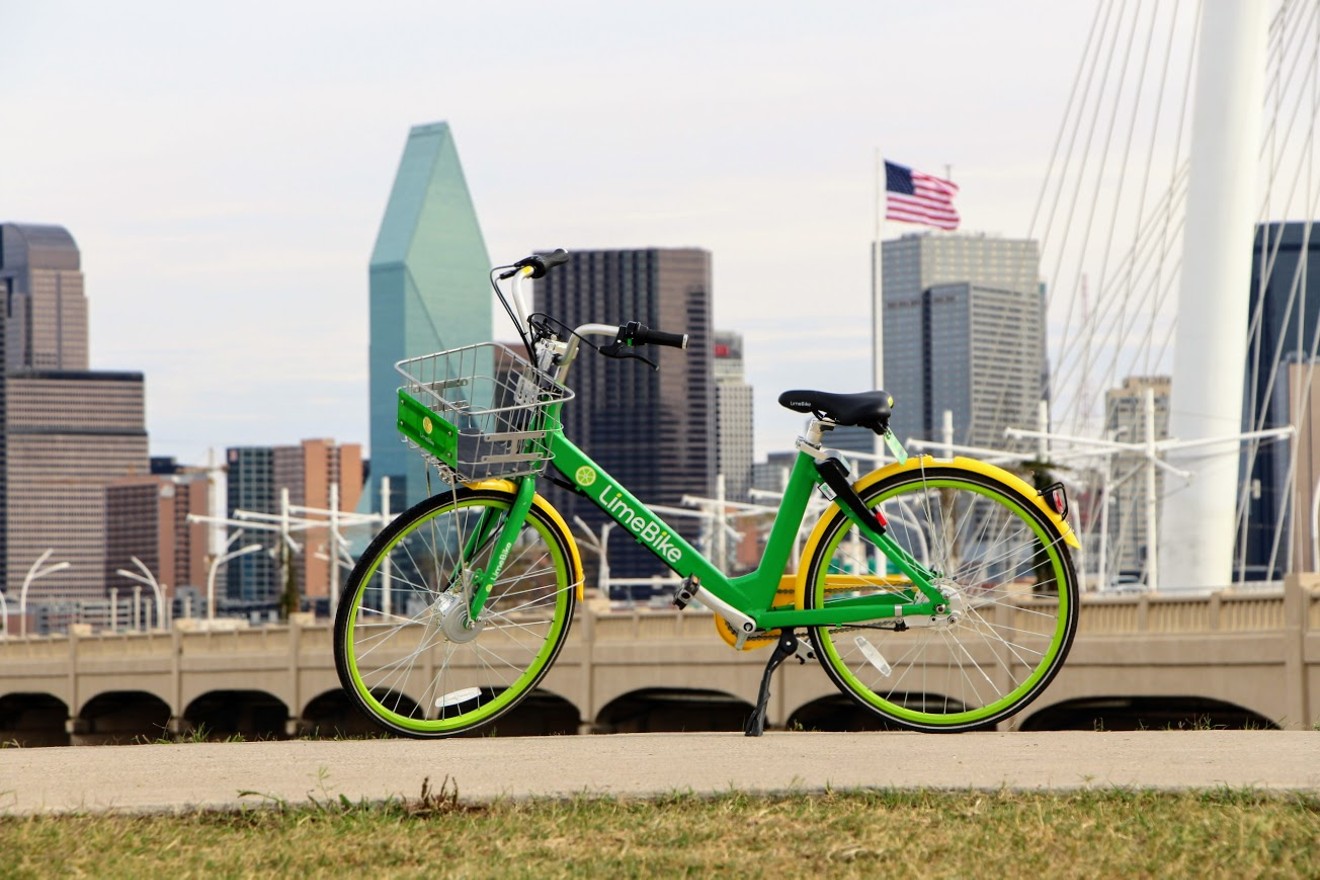This morning, LimeBike, a Silicon Valley-based startup like Spin, released data from its first half-year in DFW, showing the holes bike-share bikes are filling as well as information the city will consider as it decides how to regulate dockless bike-share companies in 2018.
LimeBike reports that since its Dallas debut in August, riders have pedaled its bikes about 105,000 miles around the city — good enough, as the company puts it, to have circled the Earth 4.2 times. Riders taking those laps have burned more than 3 million calories and are doing so at an accelerating rate, says Anthony Fleo, LimeBike's Dallas general manager.
"We've seen a consistent increase in demand," Fleo says. "It's interesting, not your typical supply-and-demand economics, but when we add supply and when we put bikes into different areas, we actually see demand go up with that. The demand is there already, and then the bikes are there."
Initially, LimeBike wanted to have 5,000 bikes in Dallas by the end of the year. The company is getting close, Fleo says, but may not reach its target because of a couple of delayed bike shipments. Despite potentially missing its supply targets, LimeBike has nearly 45,000 active riders in Dallas.
Most of those riders — about 51 percent — use the bikes during the evening rush hour and cover 1.3 miles during the average ride. Fleo says commuters are using the bikes to solve the so-called last-mile problem — how to get from a transit hub like a light rail station to an office that's out of easy walking distance. One in 5 LimeBike trips starts at or near a public transit station, according to company data.
Adding thousands of bikes to central Dallas' streetscape hasn't occurred without growing pains. The bikes often end up clumped together at popular destinations or dumped unceremoniously by the side of the road or sidewalk.
Fleo says that LimeBike does its best to redistribute bikes when too many end up in one location. The company has a response team that can retrieve rogue bikes quickly, he says.@CityOfDallas @limebike_dallas I love the idea, I really do. But now our city is starting to look like a pile bike trash. #WhiteRock #Lakeside #Photobomb pic.twitter.com/9TIq0dvGVG
— Brandon Peugh (@BrandonPeugh) November 18, 2017
"I think naturally, too, it will get a little easier because the users themselves will understand a little bit more about how it works," Fleo says. "Once they understand a little about how to do it more responsibly, I think some of those complaints will go down."
With so many cheap bikes available, some question bike share's profitability for the companies serving Dallas. Fleo told the Observer that profits in bike share come when companies achieve the right scale, but he wasn't sure if LimeBike was profitable in Dallas. By way of comparison, Dallas residents and visitors have traveled about 30,000 miles on Ofo's bikes since they launched on November 1, about 640 miles per day.
In addition to competition and discarded bikes, Dallas' bike-share companies face potential regulation from the city early next year. According to Dallas City Council member Philip Kingston, the city has allowed the companies to operate without regulations as a pilot program during the latter half of 2017. Early next year, he said last week on Facebook, the city will likely adopt rules, including charging the companies fees, requiring them to submit anonymous user data to help the city with infrastructure planning, and requiring the companies to place bikes in neighborhoods north and south of the urban core.
Kingston says he believes the bikes are cutting down on vehicle commutes.
"The eyeball test leads me to believe that we have reduced car trips and increased exercise," Kingston said. "We're going to take legitimate complaints into account to develop common-sense rules that preserve those benefits while reducing negative quality of life impacts of bike-share operations."
LimeBike says that the miles traveled on its bikes have saved 57,000 pounds of carbon dioxide when compared with what would've been emitted had those miles been traveled by car. The company says that adds up to 2,300 trees saved thanks to the nonemission of CO2, but Fleo couldn't say exactly how that works.
"The data analysts [that made the report], they have a metric. It's definitely a function of the carbon part of it," Fleo says.
The company is eager, Fleo says, to help the city build its transportation policy based on better data. "Our aim is to help provide data to the city so that you do get more protected cycling lanes and better bicycle infrastructure," he says.












